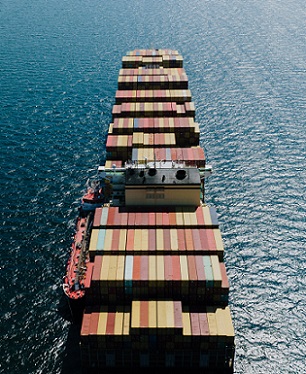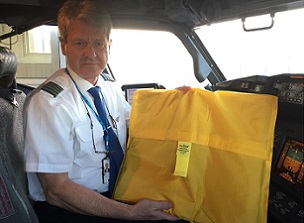 Cargo ships face an increasing rsik from lithium battery fires. Photo by Kelly on free photo website Pexels.
Cargo ships face an increasing rsik from lithium battery fires. Photo by Kelly on free photo website Pexels.
 All these everyday personal electronic devices are powered by lithium batteries
All these everyday personal electronic devices are powered by lithium batteries
 A pilot with an AvSax lithium battery fire containment bag
A pilot with an AvSax lithium battery fire containment bag
Fires caused by lithium batteries are causing astronomical losses for ship insurers.
Fires and explosions were the most expensive cause of marine claims in 2021 accounting for 18% of $9.2 billion in total losses, according to global ship insurer Allianz Global Corporate & Specialty (AGCS).
And it warns the problem will only get worse with the use of lithium batteries, especially in cars, expected to soar in the coming years.
One of the main causes is what it known as thermal runaway, a rapid, uncontrolled chemical reaction within the battery that causes the internal temperature to rise. When one cell in a battery overheats it can produce enough heat - up to 900°C (1652°F) - to make adjacent cells overheat too.
Batteries burning at such a high temperature are very difficult to put out and can even keep flaring up.
When thermal runaway happens in personal electronic devices such as mobile phones or laptops on passenger aircraft, for instance, many airlines use AvSax (http://avsax.com/) fire containment bags which contain and mitigate the fire.
But on ships, runaway fires can cause widespread and horrendous damage, even sinking some vessels.
Captain Rahul Khanna, Global Head of Marine Risk Consulting at AGCS, said: “Batteries are not only a potential cause of fire if damaged, overcharged or subjected to high temperatures, they can also aggravate other causes of fire at sea and are difficult to extinguish as they have the potential to reignite days or even weeks later.
“In most shipboard incidents a thermal runaway event can be a significant possibility unless immediate action is taken by the crew, such as suppressing a fire with copious amounts of water over a long period of time. However, this can be extremely challenging due to factors such as early detection being difficult, a shortage of crew members on board and if the vessel’s firefighting capabilities are inadequate.”
The Allianz Global Corporate & Specialty report outlines four main Lithium battery dangers on ships.
The most common causes for these fires are poor quality batteries, over-charged batteries and damaged battery cells or devices. This can be caused by poor packing and handling or the cargo shifting in rough seas if not adequately secured.
Recent serious fires on ships potentially caused by batteries include the sinking of the roll on roll off carrier Felicity Ace in March 2022 in the Atlantic Ocean just over 200 miles from the Azores.
In June 2020 a fire on the car carrier Höegh Xiamen in Florida was attributed to a failure to properly disconnect and secure vehicle batteries. In January 2020 a fire on the container ship Cosco Pacific was blamed on a Li-ion battery cargo catching fire which had not been properly declared.
Recommendations to solve the problem include:
Captain Lund added: “If the maritime industry is to improve its incident record related to the transportation of lithium-ion batteries all involved in the supply chain must understand the hazards involved, the most common causes and the problems associated with transporting in commerce.
“Regulations and guidance are specific in addressing these batteries to help prevent most incidents, but these can only be effective if they are communicated and enforced. Only through a concerted effort by stakeholders in the supply chain can we hope to reduce the rate of incidents.”